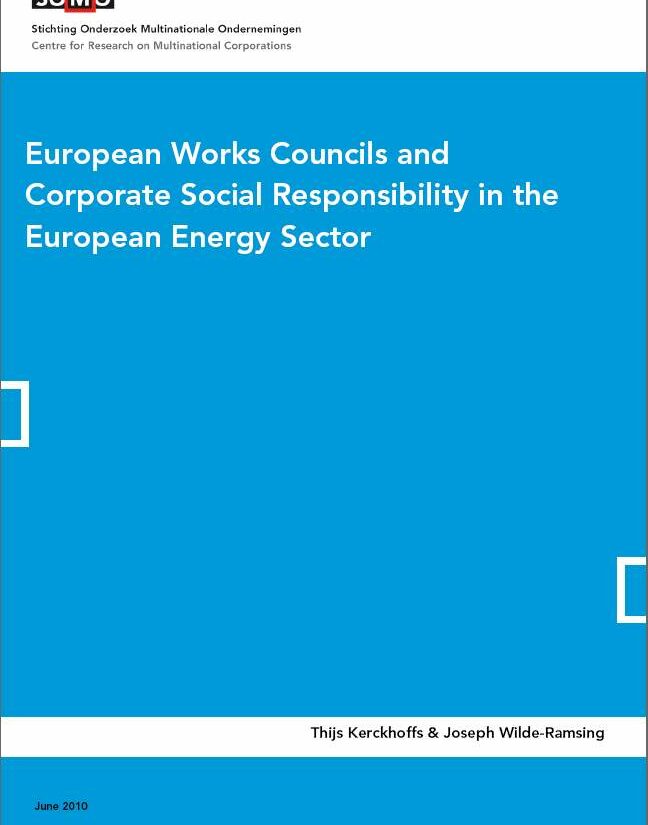
CSR and European Works Councils
As energy companies are increasingly operating across national borders, consultation forms such as employee participation are also taking on increasingly international forms. One example of this is the European Works Councils (EWCs). At the same time, attention is increasingly being paid to sustainability and Corporate Social Responsibility in the European energy sector. SOMO was commissioned by the European Public Services Union (EPSU) to carry out research into the potential role and ambition of the EWCs in formulating and implementing CSR policy. SOMO also issued recommendations to EWC members and trade unions in order to increase their influence on the social and ecological policy of the enterprise.
Over the past decade, transnational corporations (TNCs) operating in the energy sector have become increasingly active across borders in multiple European countries. As a result, employee representation in European energy companies has become more multi-national, evidenced by the rising number of active European Works Councils (EWCs) in the sector. At the same time, the concept of corporate social responsibility (CSR) has been gaining ground in the European energy sector.
The (potential) role of the EWC in developing and implementing CSR is central to this study. The main goal is to provide some insight into the existing role and ambition of EWCs with regard to CSR and to offer recommendations on how EWCs and trade unions can influence a company’s CSR policy and practice. The study examines the CSR policies of the 24 largest transnational energy companies in Europe: Centrica, ČEZ, DELTA, DONG, EDF, EDP, EnBW, Enel, E.ON, ESB, EVN, FORTUM, Gas Natural Fenosa, GDF Suez, Iberdrola, RWE, MVV, National Grid, Scottish and Southern, Statkraft, TenneT, Vattenfall, Veolia, and Verbund. For 16 of the companies, a more detailed analysis of the policies and relationship with employee representatives is conducted.
Recent years have seen energy companies increasingly aligning their CSR policies with international normative standards for sustainable development and sustainability reporting such as the UN Global Compact, the OECD Guidelines for Multinational Enterprises, the GRI, and the Carbon Disclosure Project. Around 38% of the companies makes use of all four of these CSR initiatives while 13% has not incorporated any of the four into their policy. The study notes that while a company’s efforts to align its CSR policies with these international standards is a positive step, this does not necessarily guarantee that the company is actually acting responsibly; the true test of responsible behaviour is putting the standards into practice and monitoring their implementation.
Although CSR policies are generally understood to be beyond the originally intended legal purpose of EWCs, in their most recent joint statement on CSR, both the European electricity sector employee representatives (EPSU and EMCEF) and employer groups (Eurelectric) agreed that CSR policies should be considered a subject of discussion between the social partners, i.e. between employee representatives and management. The vast majority of EWC representatives surveyed for this study considered it important that EWCs be involved in developing and monitoring company CSR policies. That said, on the whole, the respondents were not satisfied about the present situation and the possibilities they currently have to fulfil this role. However, they have a positive attitude to improve the situation and increase their influence.
The results of the research and the survey of EWC representatives offer an interesting insight into the existing role and ambition of EWCs with regard to CSR and provide the basis for a number of recommendations on how EWCs and trade unions can more effectively influence a company’s CSR policy and practice.
> Press Release 9 June 2010 EPSU
Related news
-
 Civil society organisations push for transformative global investment rulesPosted in category:News
Civil society organisations push for transformative global investment rulesPosted in category:News Bart-Jaap VerbeekPublished on:
Bart-Jaap VerbeekPublished on: -
 The Counter: strengthening the fight for climate justice around the worldPosted in category:Long read
The Counter: strengthening the fight for climate justice around the worldPosted in category:Long read Luis ScungioPublished on:
Luis ScungioPublished on: -


